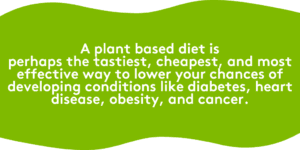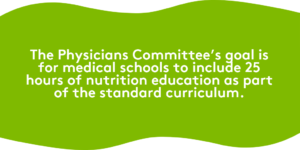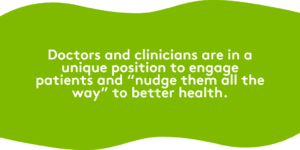Teaching the World about Plant Based Diets
Part two in a series on plant based diets and their role in health and healthcare; read part one here. This blog was contributed by Lee Crosby, RD from the Physicians Committee for Responsible Medicine (PCRM), an organization that is on a mission to educate everyone about the good news of plant forward eating.

Lee Crosby, RD Physicians Committee for Responsible Medicine (PCRM), Contributor
There’s no silver bullet that can stop chronic disease, but a plant based diet is perhaps the tastiest, cheapest, and most effective way to lower your chances of developing conditions like diabetes, heart disease, obesity, and cancer. That is the power of food.
That’s also why the Physicians Committee for Responsible Medicine was founded in 1985 by Neal D. Barnard, MD. If you watch both his TEDx Talks, explaining the benefits of a plant based diet for people at risk for diabetes and Alzheimer’s disease, you’ll not only start considering a plant based diet, you’ll begin to understand PCRM’s mission.

The nonprofit organization is committed to researching and promoting plant based diets, preventive medicine, and alternatives to animal testing. Their website is a treasure trove of nutritional information, research, and recipes. And that’s just the beginning.
PCRM leverages its membership of more than 175,000 members, including 12,000 physicians, to make real, concrete changes in our communities. For example, as part of the group’s annual report ranking hospital food for healthfulness, they encouraged hospitals to replace fast food with healthier options.
“We want to inject a dose of nutrition into a clinical world where it’s been ignored for too long,” says Lee Crosby, a registered dietitian with the Physicians Committee and author of Veggie Quest, a food and nutrition blog packed with tips, recipes, and other information about enjoying a plant based diet. “The key is making it easy and fun to make a big change.”
“I know firsthand that eating more veggies and whole plant foods can be tough at times,” she continues. “Especially when it seems like the world is conspiring against you!”
It’s worth the trouble, however, and PCRM has the data to prove it. That’s why they are working to teach the world how they can achieve better health with a plant based diet.
Educating the Experts
It isn’t just patients who struggle to understand and practice plant based nutrition. Most doctors don’t know where to begin.
In a 2018 survey, 94 percent of internal medicine residents said they recognize the importance of diet in healing. But only 39 percent report receiving any training in nutrition, and a mere 14 percent feel qualified to discuss it with patients.
“Everyone needs help when they start something new,” explains Crosby. “If you’re a doctor or nurse, you probably had one or two nutrition courses throughout your training, if that. So it makes sense that many healthcare professionals still resist the idea that nutrition can effectively reverse certain disease states. They might not realize how much evidence there is, compared to pharmacology. Part of the challenge is winning them over to thinking about plant based nutrition as a tool in their clinical toolbox.”
That’s why PCRM offers free continuing education courses, webinars, newsletters, videos, and blogs. They’ve even designed a free app to provide expert, evidence-based support to healthcare professionals, answering questions on nutrition for disease prevention and treatment, including best practices for discussing dietary changes with patients.
For example, doctors and clinicians need to bring up diet in a way that doesn’t sound judgmental—which can be challenging. Doctors also have limited time with each patient, so they need to make their case quickly and effectively. They should be able to educate on the basics—and importance of—good nutrition, and refer patients to registered dietitians when further support is needed.
It’s time to raise the bar in healthcare. PCRM’s goal is for medical schools to include 25 hours of nutrition education as part of the standard curriculum. In the meantime, they are giving providers tools for incorporating better nutrition into the healing process.

Interested? Check out the free continuing education classes the Physicians Committee for Responsible Medicine offers healthcare professionals, in many cases for credit.
It Takes A Village
Community can be undervalued in our culture, but if you’re planning to make a big change like embracing a plant based diet, reach out. Lee Crosby believes that the single most important variable in your successful transition is whether you have a partner or support system that will have your back.
“Some may try to sabotage your healthy changes, but most people will want to help you out,” says Crosby. “By announcing your change, you give those people the opportunity to lift you up and nurture you. Your friends won’t mind going to the same sushi place twice in a row, because you can get brown rice for your veggie rolls there. Your sister will make vegetarian chili instead of the beefy version when you come over for dinner—or at least put some aside for you.”
“Taking the plunge and ‘going public’ can make your new habit—and sticking with it—so much easier.”
No matter what your friends think, the Physicians Committee’s resources can help you along the way. Sign up now for the 21-Day Vegan Kickstart, which sends meal plans, recipes, and daily videos your way, along with plenty of support. You’ll never be alone.
When a Plan Comes Together
The best way to win people over to a plant based diet in the long-term is holistically. Evidence-based online tools help patients and communities educate themselves. Support networks and vegetarian options allow people to achieve their goals, even on rough days. But healthcare professionals are key.
We know that the people most responsive to change are those who have gone through a recent health challenge. Crosby herself became interested in plant based nutrition only after a breast health scare.
That means doctors and clinicians are in a unique position to engage patients and “nudge them all the way” to better health.

But nudging anyone toward a better diet is complicated. For example, we recommend inviting patients with chronic diseases in for weekly classes, where we can talk about management and disease reversal. But statistics and recipes aren’t always enough.
There may be emotional factors to consider, such as thinking of fried chicken, rather than a fruit smoothie, as comfort food. “We’re also living in an environment that we’re not wired to handle,” explains Crosby. “The foods we eat are designed to be addictive. Think about ‘crunch meters’ that gauge the optimal crispiness of potato chips.”
How do you create a new routine when your old environment seems to be working against it? That’s a multifaceted endeavor, and part of it is creating a new environment. That’s what PCRM is planning to do, one doctor, one hospital, and one community at a time.




